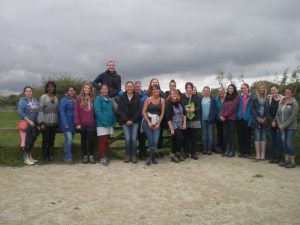Review of Post-18 education
Tim Bradshaw, who leads the Russell Group, was in the media this week as he called for maintenance grants to be restored to help improve diversity in HE.
- BBC coverage here
- “…Mr Bradshaw said the government should make more funding available to help improve access to higher education, instead of “putting all the blame on universities”.
- The group is due to submit proposals to the government on how maintenance grants could be restored as part of a review into post-18 education funding. Their options include a “living wage” for students who had been eligible for school meals during their school years. The £8,192 grant would reduce the debt of a student by £27,800, according to the proposal.
- Mr Bradshaw said:
“It could be very targeted, really cost-effective and actually make quite a substantial difference to those from disadvantaged backgrounds who may inherently be very nervous about taking on an additional loan.”
- A Department for Education spokesman said poorer undergraduates will get more help than ever when they go to university in the autumn. He said:
“Finance should never be a barrier to a young person’s education, and we are seeing real progress, with disadvantaged 18-year-olds 50% more likely to enter full-time university in 2017 compared with 2009. We have increased the maximum grants and loans available to support students with costs, and disadvantaged students starting their courses this year will have access to the largest ever amounts of cash-in-hand support for their living costs.”
- The spokesman also said the department was working with the national regulator for higher education in England – the Office for Students – to encourage more young people from disadvantaged groups to apply to university and give them support when there.
- Guardian here
- When asked whether the loss of maintenance grants, coupled with £9,250 annual tuition fees, could be dissuading students from poorer backgrounds going to university, Bradshaw conceded: “Yes it might be. The student loans system is very complicated and difficult to understand.”
- The grants were replaced in the 2016-17 academic year by loans which students would start paying back when they earned more than £21,000 a year.
- In effect, this means that the poorest students – whose parents are unable to supplement their loan, or indeed help them repay their loans – face an even greater burden of debt after their studies, which could amount to about £58,000 for a three-year course.
- This could also put them off from studying in the most expensive parts of the country, such as London and Oxford.
- The Russell Group has been told it needs “to go further” in improving access for disadvantaged pupils with just 6.5% of students in last year’s intake from the poorest parts of the country.
The story was also reported in Politics Home.
In the Independent Robert Halfon (Chair of the Commons Education Select Committee) is sympathetic to the restoration of maintenance grants but doesn’t see it as a magic panacea to bring more disadvantaged students into university. In turn he called on the Russell Group to accept vocational qualifications. Halfon also stated that degree apprenticeships at all universities would be transformative in allowing disadvantaged students to earn whilst they learn – implying this would significantly widen access.
UUK report – future skills
UUK have released a report today “Solving Future Skills Challenges”. It is only 32 pages but contains a lot of data and analysis from a range of sources. The recommendations are set out below.
The Guardian covers the story here:
- The UK economy could benefit from more people of all ages attending university.
- The advance of automation, robotics, artificial intelligence and digital technology, as well as the challenges of Brexit and an ageing population are creating greater demand for those with level 4 and above qualifications. Including HNC/Ds, foundation, undergraduate and postgraduate degrees.
- The Universities UK report highlights the need for continual upgrading of skills, lifelong learning and study of higher education qualifications at all levels.
- The percentage of young people from England entering higher education has reached 49%, but there has been a steady decline in part-time and mature student numbers.
- The report calls on policymakers to help reverse the latter trend and encourage closer links between universities and employers.
Also:
- The recruitment gap widens: in 2016 440,000 new professional jobs were created but there were only 316,690 first-degree UK-based graduates – leaving a recruitment gap of 123,310 – more than double the gap in 2015.
- By 2030, it is estimated that there will be a UK talent deficit of between 600,000 to 1.2 million workers for both our financial and business sector, and technology, media and telecommunications sector.
- 65% of children entering primary schools today will ultimately work in new jobs and functions that don’t currently exist.
- Universities provide around 41% of all professional and technical qualifications
Report recommendations:
- Government plays a key role in providing an overarching strategy that brings together and enhances the range of policies and interventions that support skills development and educator–employer engagement, including higher level skills, to ensure a ‘whole-skills’ policy approach. Pathways, progression routes and bridging provision, avoiding an artificial ‘binary divide’ between academic and vocational education, and enhancing opportunities for learners, should together be an essential part of the skills strategy.
- Government can facilitate the development and sharing of more robust, comprehensive and adaptable intelligence about future skills needs across sectors and localities.
- This approach needs to be supported at both national and local level, including being embedded in sector deals, and with skills advisory boards providing a strong foundation for local industrial strategies.
- Policies to support employers to provide opportunities for work experience should be a priority, especially among SMEs.
- Universities should ensure that they enhance and improve their role through:
- having an integrated, embedded strategy that captures, builds upon and enhances the feedback and intelligence gained through existing partnerships, draws in advice and evidence at the sectoral, regional and the national level, and drives teaching, learning and course development
- committing to increasing employer advice and input, work experience opportunities, and the delivery of enterprise skills
- having a co-ordinated, effective and clear employer engagement service – extending their relationship with students beyond graduation to include careers advice, skills provision and engagement with alumni to enhance employer advice and input
- Employers need to invest in training, development and partnerships as part of enhancing their talent strategies. Staff at all levels should be encouraged to engage with universities and to enhance their recruitment of talent. More work experience opportunities should be offered and greater collaboration in the development of transferable skills. Sector collaboration should be supported to adopt a collaborative ‘eco-system’ approach to developing skills and enhancing their skills-supply chains.
- Employers and universities must also test and develop existing partnership approaches and collaborative processes to ensure that they will be both robust and agile enough to succeed in an increasingly uncertain and disrupted future.
In order to develop specific policy recommendations to meet the challenges outlined above, Universities UK will be undertaking a range of research projects and activities over the coming months, including the following:
- The economic case for flexible learning – this project, undertaken in conjunction with the CBI, will look specifically at how the government can encourage learning that is more flexible, and support people to study at different times in their lives.
- High-level skills through effective partnerships and pathways – this work will consider how partnerships between higher education and further education providers are meeting the local skills needs of businesses and how the policy environment can help promote and enhance these partnerships.
- Integrating higher level skills and adopting a ‘wholeskills’ approach to local industrial strategies and skills advisory boards – we will be developing advice and guidance based on practical examples to support the development of effective skills strategies and partnerships at the local level.
- Technical and professional education – this project looks at developing effective links, pathways and bridging provision to ensure effective opportunities for learners and employers.
- Enhancing intelligence on employer needs – this collaborative project aims to ensure a detailed analysis is undertaken of the Employer skills survey to provide intelligence for universities, employers and policymakers.
Research Professional also ran an article related to the UUK report in Vice-chancellors set out ideas to avoid future skills gaps. It talks of maximising attendance at university, incentivising university/business links, and reversing the part time and mature decline through flexible and lifelong learning.
Student Employment
Part time work
The Financial Times writes of the reduction in working students in The decline of the student summer job.
In 1997 the number of young students (aged 18-24) that worked whilst studying decreased by 12% (from 48% in 1997 to 36% in 2017). The decrease was more pronounced in working 16-17 year olds (22%). The article continues on to consider automation (less low skill jobs available), the pressure to undertake unpaid internships, and tuition fees (which increase focus on academic success) as reasons for the decline. It also considers the attractiveness of the gig economy to students.
There is a section on unpaid internships which highlights their attractiveness to employers over low skill employment whilst acknowledging the elements privilege and unfairness play.
Ben Lyons (from Intern Aware) says that internships at high-profile companies, even if they are unpaid, typically count for more with prospective employers than paid work in a bar. Ben continues: “It might be the case that someone working several unrelated summer jobs might have more get up and go. Employers often assume that people who have done 20 internships have more initiative rather than thinking that they have more advantages.”
Career placements
The OfS have published a City University blog on social mobility recruitment within their summer placement scheme. It notes that almost half of top UK firms have introduced questions about applicants’ education, free school meals and parents’ jobs in their recruitment process. Their Micro-Placements (MPP) career exploration scheme addresses soft skills development amongst students from underrepresented groups.
The blog talks of how the messaging can drive an organisation’s corporate social responsibility agenda, helping to attract diverse talent by raising their profile with students across all backgrounds, having them recognised as a key recruiter that acknowledges the necessity of a wide range of talents and driving social mobility.
It is rewarding that employers are very interested in how the MPP gives underrepresented students the opportunity to increase their employability skills. Dissemination through promotional events and tailored messaging encourages employers of all sizes and sectors to see the benefits of diversifying their recruitment pool and the necessity of offering these flexible opportunities to attract a wealth of talent, experience and perspectives.
By mobilising talented student cohorts early…we believe we can really address the most pressing issues our students face around employability. By engaging employers in a creative way we can develop the skills and networks students need to successfully enter employment after graduation.
Post study work visa
New Zealand has radically changed its post study work visa. From November international students completing level 7 bachelor’s degrees, or above, will be given a three-year open work visa. Lower level students (studying for at least 60 weeks) will be given a one-year work visa. The employer-sponsored visa will be abolished. The Immigration minister stated: “Our changes to post-study work rights will boost New Zealand’s economy, reduce student exploitation and promote our regional education offerings.”
Education Technology Enhancement
Damian Hinds (Secretary of State for Education) has called on the tech industry to ‘launch an education revolution for schools, colleges and universities’. A Government news story notes that few schools are harnessing existing technological opportunities and Damian urges the tech sector to tackle five classroom challenges to innovate and improve teaching and revolutionise unnecessary workload.
- Inclusion, access and improved teaching practices
- Effective and efficient assessment processes
- Flexible methods of teacher training/development
- Reduce non-teaching admin burden
- Lifelong/online learning solutions (post compulsory education)
Read more here.
Other news
Clearing: Nick Hillman from HEPI blogs on clearing in How to land a jumbo jet on a postage stamp. He highlights how 2018’s clearing is a buyer’s market, considers the decision making art of when to stop recruiting, and the limitation of official student planning numbers.
New approach to immigration: CBI argue the Government should scrap the net migration target. Alternatively they suggest EU citizens should instead be registered on arrival and have their visits restricted to three months, “unless they can prove that they are working, studying or are self-sufficient”. See the Politics Home or Financial Times articles; read the CBI document in full; or a much shorter summary provided by Dods which includes a focused education sector analysis section.
International Students: Times Higher use the results of a student survey to highlight UK student opinion on studying alongside international students can be mixed. It proposes universities should do more to promote the benefits experienced by engaging with international peers.
Horizon 2020: The Department for Business, Energy and Industrial Strategy published Horizon 2020 participation statistics. It shows the number of times UK organisations participated Horizon 2020 and the value of the EU’s contributions. The UK remains the second strongest participant in Horizon 2020 (for participation and total funding obtained). The data tables break down and also list the top 50 universities for participation.
Stronger Communities: This week the Government launched the Civil Society Strategy policy paper as a mechanism to create stronger communities by bringing together businesses, charities and the public sector. They define civil society as individuals or organisations deliberately acting to create social value, independent of state control. The paper focuses on five key foundations of social value: people, places and the public, private, and social sectors.
It emphasises a connected society and creating opportunities for people to actively take part in community decisions, as well as highlighting ways to harness the power of digital and technology for public good. It will complement the Government’s Industrial Strategy by boosting productivity through thriving communities.
As part of the Civil Society Strategy, the Government will:
- Unlock £20 million from inactive charitable trusts (those which spend less than 30% of their annual income) to support community organisations over the next two years.
- Launch an ‘Innovation in Democracy’ pilot scheme in six areas trialling creative ways for people to take a more direct role in decisions that affect their local area. This could include Citizens’ Juries or mass participation in decision-making on community issues via an online poll or app.
- Establish an independent organisation that will distribute £90 million from dormant bank accounts to get disadvantaged young people into employment. This new organisation will harness the experience of grassroots youth workers, businesses, and other local services, to help young people achieve their full potential. Also use £55 million from dormant bank accounts to tackle financial exclusion and the problem of access to affordable credit.
- Support charities to make their voices heard on issues that matter to them and ensuring that charitable trustees reflect the diversity of the society they serve.
- Strengthen Britain’s values of corporate responsibility, through the launch of a new Leadership Group, formed of senior figures from the business, investment and social sectors, to put social and environmental responsibility at the heart of company decisions.
- Improve the use of the Public Services (Social Value) Act 2012 to ensure that organisations can generate more social value for communities when spending public money on government contracts.
- Use digital technology to improve the work charities can provide to support healthy ageing, bolster online safety and better connect people in an effort to tackle loneliness.
Read the executive summary (5 pages) here.
Catapult Funding: On Friday Chancellor Phillip Hammond announced £780 million of funding to expand Catapult centres developing a range of innovative new technologies for tomorrow across the UK.
Intellectual Property: If patents, trademarks, design rights, and copyright confound you read this clear and simple blog post by Research Fundermentals.
Consultations
Click here to view the updated consultation tracker. Email us on policy@bournemouth.ac.uk if you’d like to contribute to any of the current consultations.
Subscribe!
To subscribe to the weekly policy update simply email policy@bournemouth.ac.uk
JANE FORSTER | SARAH CARTER
Policy Advisor Policy & Public Affairs Officer
66724 65070
Follow: @PolicyBU on Twitter | policy@bournemouth.ac.uk
 Over the last twenty-five years, Bournemouth University (BU) has built up a wealth of expertise in the area of media history. Not only has this knowledge helped to better understand the development of radio programmes of the time, but it is also helping to inform the teaching and education of future broadcasters.
Over the last twenty-five years, Bournemouth University (BU) has built up a wealth of expertise in the area of media history. Not only has this knowledge helped to better understand the development of radio programmes of the time, but it is also helping to inform the teaching and education of future broadcasters. Almost every day, we face and overcome any number of small stresses and difficulties which mostly have no effect on our overall wellbeing. However, every now and again we experience life-changing events, a serious illness, the death of a parent or the breakdown of a relationship, all of which can be extremely difficult to deal with. Research carried out at Bournemouth University suggests that not only can these events affect our mental health, but they can also have consequences for our physical health.
Almost every day, we face and overcome any number of small stresses and difficulties which mostly have no effect on our overall wellbeing. However, every now and again we experience life-changing events, a serious illness, the death of a parent or the breakdown of a relationship, all of which can be extremely difficult to deal with. Research carried out at Bournemouth University suggests that not only can these events affect our mental health, but they can also have consequences for our physical health.











 The Arts & Humanities Research Council and BBC Radio 3 are
The Arts & Humanities Research Council and BBC Radio 3 are  The Engineering and Physical Sciences Research Council (EPSRC) has published further diversity data related to peer review. This extension of data for Equality, Diversity and Inclusion (E,D&I) will highlight the progress made to date to improve diversity in their peer review process, and the opportunities to continue to work with their communities to make further improvements. Please
The Engineering and Physical Sciences Research Council (EPSRC) has published further diversity data related to peer review. This extension of data for Equality, Diversity and Inclusion (E,D&I) will highlight the progress made to date to improve diversity in their peer review process, and the opportunities to continue to work with their communities to make further improvements. Please 












 REF Code of Practice consultation is open!
REF Code of Practice consultation is open! BU Leads AI-Driven Work Package in EU Horizon SUSHEAS Project
BU Leads AI-Driven Work Package in EU Horizon SUSHEAS Project Evidence Synthesis Centre open at Kathmandu University
Evidence Synthesis Centre open at Kathmandu University Expand Your Impact: Collaboration and Networking Workshops for Researchers
Expand Your Impact: Collaboration and Networking Workshops for Researchers ECR Funding Open Call: Research Culture & Community Grant – Apply now
ECR Funding Open Call: Research Culture & Community Grant – Apply now ECR Funding Open Call: Research Culture & Community Grant – Application Deadline Friday 12 December
ECR Funding Open Call: Research Culture & Community Grant – Application Deadline Friday 12 December MSCA Postdoctoral Fellowships 2025 Call
MSCA Postdoctoral Fellowships 2025 Call ERC Advanced Grant 2025 Webinar
ERC Advanced Grant 2025 Webinar Update on UKRO services
Update on UKRO services European research project exploring use of ‘virtual twins’ to better manage metabolic associated fatty liver disease
European research project exploring use of ‘virtual twins’ to better manage metabolic associated fatty liver disease